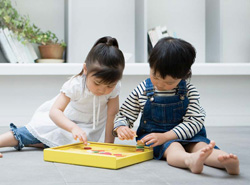Rivalry Between Siblings

Relationships between brothers and sisters are often made of complicity, happy memories and bonding. However, we have to admit that these relationships sometimes have their share of jealousy and rivalry.
A certain dose of rivalry is healthy in brothers and sisters since it pushes self-assertiveness in children. Some studies have even demonstrated that encouraging equality in your children can nourish rivalry!
First of all, let’s make one thing clear: no parent can love his children exactly the same way. It does not mean loving one of your children less and it is not a crime. It is just reality. You love your children differently, that’s all! The same thing goes for your brothers and sisters or your friends. Knowing this, you can expect to be unfair sometimes when it is time to rule out an argument and that is why you must be careful and solve problems…not create them.
In addition, there is no ideal age gap between children. If your children are close in age, they might be very united but also very jealous. If there’s a significant age gap between your children, they will have less and less things in common as they grow up. A good age difference is considered to be between two years and three and a half years.
Preparing your child for the arrival of a new baby
The first signs of jealousy often appear after the birth of the second child. However, there are ways to help this major life change go smoothly with all the family members. During pregnancy, it will be important to have multiple discussions with your child to explain that the new baby is not a threat and that you will always love him just the same. Take this time to talk about how he was as a baby, take out photo albums of when your child was born or watch homemade videos. Constantly hearing that you love him will help your child feel secure about the new baby. If possible, take your child to visit friends who have recently had a baby; this will help your little one to get a better picture of the reality to come.
Even if it is recommended to congratulate your first born on being all grown up, making the bed or brushing his teeth, be careful not to push your child to grow up too fast. When your child will see his new sibling spending a great amount of time in your arms, this might urge him to regress to anterior stages of maturity in order to become a baby that will have your undivided attention.
Changing rivalry
In a perfect world, brothers and sisters would always act like… brothers and sisters! Isn’t it ironic to describe a best friend as a sister or brother when in reality, siblings often put many years into getting along well? Some siblings can even grow up to become adults who go their separate ways without truly having built a strong bond with each other. Many different factors come into play when evaluating rivalry between siblings: the gender, their place in the family and the age gap can impact their behaviour.
Recognizing jealousy
Children can express jealousy in several different ways. One thing is certain: his behaviour will change. By paying close attention to your child’s reactions, you will be able to make a more effective intervention.
A jealous child tends to:
• Attract everyone’s attention to himself.
• Be sullen most of the time.
• Refuse to do his usual activities.
• Show great signs of affection to his father in order to make the mother jealous.
• Want to be held and carried around.
• Act like a baby (sucking his finger, wetting his pants, asking for diapers and bottles).
• Disobey.
• Do foolish things on purpose.
• Try to hit or bite the new baby.
Beware of…
• Obvious preferences. You may not always be conscious of doing it but if you always blame the same child for the same things, chances are that you are encouraging rivalry rather than putting an end to it.
• Comparing your children. One may be joyful while the other is taciturn or one may be athletic while the other is artistic. Remember that your children are DIFFERENT and that comparing them will not help the situation.
• Preferences linked to gender. Constantly repeating that you always wished for a girl or a boy will definitely make your child feel rejected if he is not the “right gender.”
• Your reactions towards your children’s rivalry. If you forbid it completely, you may make things worse. On the other hand, indifference will not help solve the problem either.
Useful tips to diminish rivalry
• You can purchase a baby doll with diapers, a milk bottle and a small blanket. When you return home after delivery, you can give your oldest child the responsibility of his own baby. This way, your little one can imitate you and will not feel so left out.
• Set aside quality time with each of your children to make them feel special and to let them know that they are important and will always have their place.
• Do not force your child to take interest in the new baby. This will come naturally with time.
• Never leave your oldest child alone with the newborn baby. He may hurt the baby to express his unhappiness.
• Make sure the new baby is not always the center of attention when visitors come over to the house. Let others know that all your
children have great qualities.
• Allow your oldest child to help out by handing you a diaper, a pajama or a toy.
For older children
• Try letting them solve their problem by themselves by staying out of the conflict.
• Do not make reproaches before giving your children the chance to hear each other out.
• Do not try to figure out who started first. This will only add tension to the conflict.
• Reward your children for their good behaviour and lack of quarrels.
• Establish rules on what acceptable behaviour is and what it is not (hitting, biting, etc.)
• Never tolerate aggressive behaviour.
• Encourage your children to solve conflicts by communicating rather than by arguing. It may not work every time but the message
will get through with time.
• Give your children a task to accomplish together.
Courtesy of: MotherForLife.com



